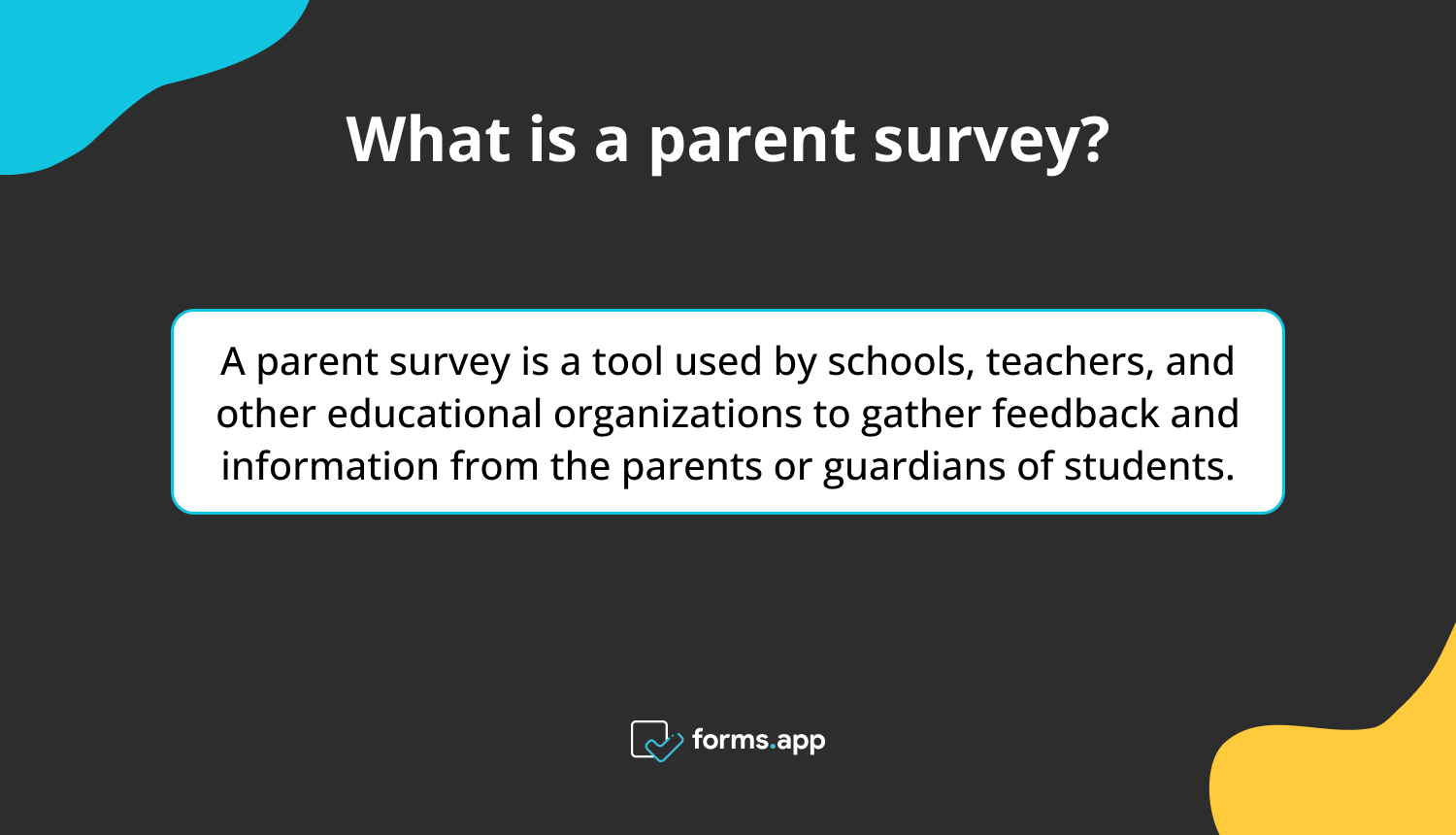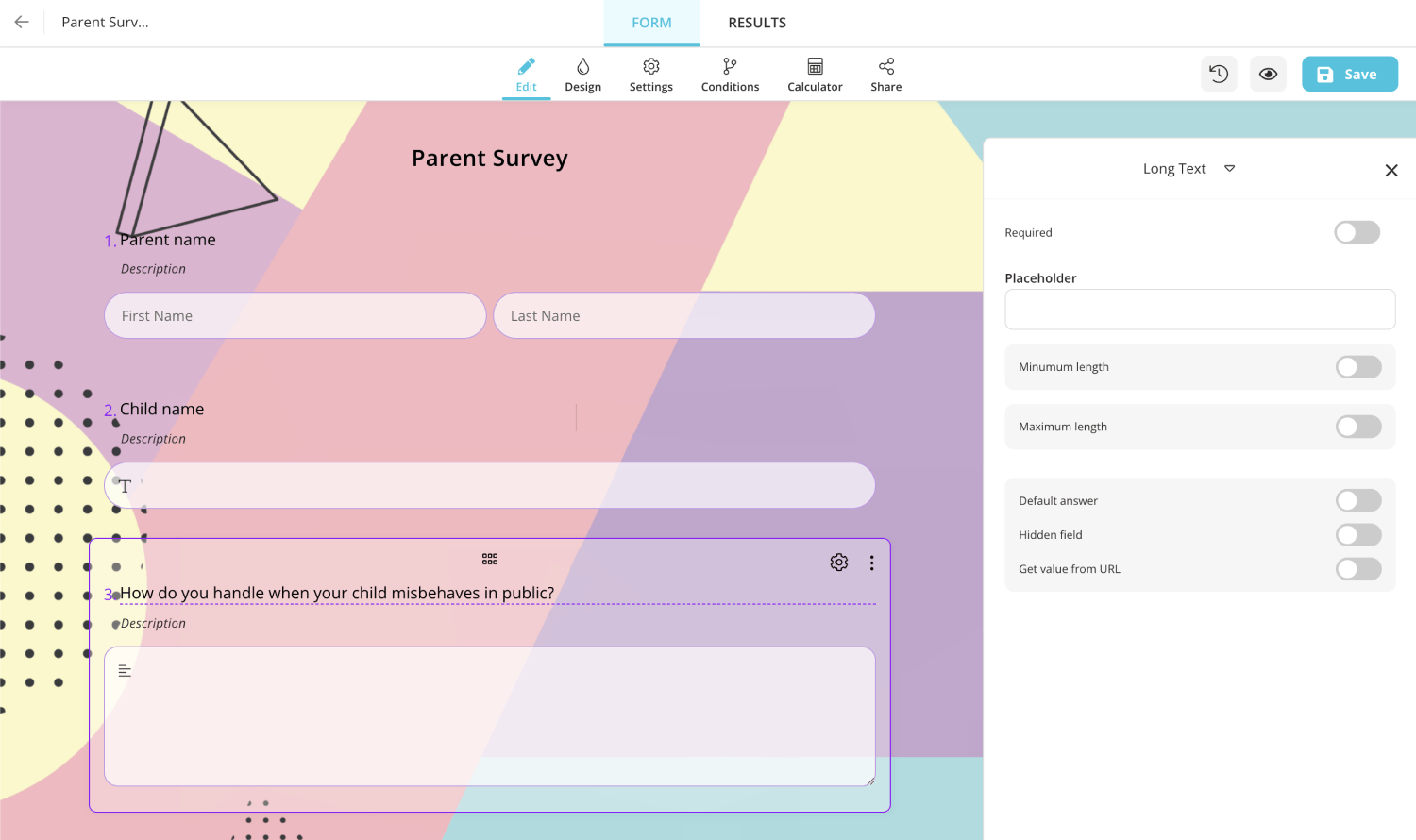A parent survey is a valuable tool for schools and other educational organizations to get to know the parents of their students. They gather clear information by gathering feedback and asking appropriate questions on specific topics. The results obtained by these parent surveys help identify concerns, improve communication, monitor progress, and make more inclusive decisions that benefit students and their families.
The easiest way to create parent surveys and distribute them among them is to do it online with the help of an online survey maker. When online surveys are made and sent, parents can answer the questions on the surveys anywhere, anytime.
What is a parent survey?
A parent survey is a tool used by schools, teachers, and other educational organizations to gather feedback and information from the parents or guardians of students. These surveys may include questions about the school's teaching methods, communication practices, and overall satisfaction with the school. The information gathered through the surveys can be used to improve the educational experience and to identify areas where the school can improve.

The definition of parent survey
Top 55 parent survey question examples to include in your questionnaire
Using a parent survey surely helps gather information. You can use general questions as it is a feedback form or focus on one or multiple subjects you need to get information on. For example, you can focus on parent survey questions for childcare and use questions on that.
Parent survey questions to learn parenting styles
These questions are a great way for researchers or educators to collect information on how parents approach raising their children. They may be about specific parenting practices and beliefs, such as discipline techniques or attitudes toward education.
1 - On a scale of 1-5, how often do you use physical discipline when dealing with your child's misbehavior?
2 - How do you handle when your child expresses negative emotions or stress?
3 - How do you communicate with your child about their behavior and actions?
4 - How do you handle when your child misbehaves in public?
5 - How do you show affection and positive reinforcement to your child?
6 - How do you prioritize your child's needs and wants in relation to your own?
7 - How do you involve your child in decision-making and problem-solving in your household?
8 - How do you balance setting boundaries for your child with allowing them to make their own choices?
9 - How do you involve your child in household chores and responsibilities?

Parent survey questions for self-assessment
Self-assessment questions help parents identify their strengths and build around them while showing them areas where they may need to make changes or seek support. Self-assessment can be a useful tool for parents who want to reflect on their parenting style and make changes to improve themselves.
10 - How well do you feel you understand your child's educational progress?
11 - How often do you communicate with your child's teacher(s)?
12 - How satisfied are you with the communication you receive from your child's school?
13 - How involved do you feel in your child's education?
14 - How often do you think you need to be involved in your child’s education for them to succeed?
15 - Are you satisfied with the support provided by the school for your child's unique needs?
16 - Are you satisfied with the academic progress of your child?
17 - How satisfied are you with the extracurricular activities offered by the school?
18 - On a scale of 1 to 5, how much do you agree that you are capable of dealing with your child’s emotions appropriately?
19 - Do you think that you constantly need to support your child’s learning at home?

Parent survey questions for schools
Basically, these are the questions that are related to the school, such as the quality of education, communication with teachers and staff, and overall satisfaction with the school’s performance. These parent survey questions for school improvement could be in the category for parent survey questions for teachers or special education parent survey questions too.
20 - How satisfied are you with the overall academic performance of the school?
21 - How satisfied are you with the quality of the school's teachers?
22 - On a scale of 1 to 5, how much do you think that the school's curriculum is adequate?
23 - How satisfied are you with the school's extracurricular activities and programs?
24 - How satisfied are you with the school's support for students with special needs?
25 - How satisfied are you with the school's support for student's mental health and well-being?
26 - How satisfied are you with the school's support for families?
27 - How satisfied are you with the school's support for parent engagement?
28 - Are there any specific areas that you feel the school needs to improve?
29 - Are there any specific suggestions you have for how the school can better support your child's education?
30 - How satisfied are you with the communication and updates provided by the school regarding your child's progress and performance?
31 - How satisfied are you with the level of support provided by the school for your child's academic and emotional needs?
32 - How satisfied are you with the availability and quality of resources and materials provided by the school?
33 - How satisfied are you with the level of safety and security provided by the school?
34 - How satisfied are you with the level of diversity and inclusion within the school community?

Parent survey questions about academic stress
Academic stress is a big problem that needs to be addressed. If it goes undetected by the teachers and parents it could damage the child’s mental well being. That’s why it is crucial to ask about this subject as well.
35 - How often does your child express feelings of stress or anxiety related to their academic performance or schoolwork?
36 - In your opinion, what are the main sources of stress or pressure that your child experiences in relation to their schoolwork or academic performance?
37 - How does your child typically cope with stress or pressure related to their academic performance or schoolwork?
38 - Have you noticed any changes in your child's behavior or mood that you believe may be related to academic stress or pressure?
39 - How do you feel about the level of homework and academic demands placed on your child?
40 - In your opinion, how do your child's school and teachers handle academic stress and pressure on students?
41 - How do you communicate with your child's school or teachers about issues related to academic stress or pressure?
42 - Do you have any suggestions for ways that the school or teachers can better support your child in managing academic stress or pressure?
43 - How do you, as a parent, help your child balance their academic workload with other activities and responsibilities?
44 - Can you give me an instance when your child felt overwhelmed by academic pressure and how did you handle it?

Parent survey questions for after-school activities
Sometimes after-school activities matter as much as educational activities for the student. It help their mental and physical health. You can ask about what kind of activities parents wish for their children and some details.
45 - How important are after-school activities to your child's overall development?
46 - What types of after-school activities is your child currently involved in?
47 - How often does your child participate in after-school activities?
48 - How do you feel about the cost of after-school activities and their financial impact on your family?
49 - How does your child balance after-school activities with their academic and homework responsibilities?
50 - How do you communicate with your child's after-school activity leaders or coaches?
51 - How do you feel about the level of supervision and safety provided during after-school activities?
52 - How do you determine which after-school activities are appropriate for your child?
53 - How does your child's participation in after-school activities affect their social life and relationships with peers?
54 - What kind of after-school activities would you like your child to participate in?
55 - Do you think after-school activities hinder your child’s studying?

How to create your own parent survey
There are different tools for creating an online parent survey, and a great one of them is a survey maker called forms.app! forms.app is a smart online tool that offers over a thousand free-to-use templates and many useful features. Now, let us go through how to create your survey in a matter of minutes. here is how to create your survey with some examples of parent surveys for schools.
- Go to forms.app and log into your account.
- Go to the templates section and choose the appropriate one. You can start with one and customize it as much as you want. E.g., adding/deleting questions, customizing the design, etc.
- You can also create your survey from scratch easily.
- Finalize the survey and check the end result by clicking the eye icon on the top right corner.
- Finish your survey and send it to the parents you want to know more about.

Conclusion
Having a parent survey is a great way to make sure parents are involved in their child’s education or at least aware of it. A different number of parent/school surveys can be used according to the data one wants to collect. And the easiest way to start your own survey is with the help of forms.app. It is a powerful survey creator with many survey templates and useful form fields. Go through this list of questions for parents and have your survey ready in no time!



